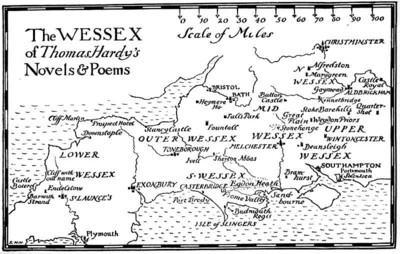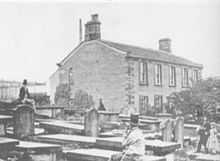British regional literature

The setting is particularly important in regional literature. In literature regionalism refers to fiction or poetry that focuses on specific features, such as dialect, customs, history, and landscape, of a particular region (also called local colour): "Such a locale is likely to be rural and/or provincial." [1]
Development
Thomas Hardy's (1840-1928) novels can be described as regional because of the way he makes use of these elements in relation to a part of the West of England, that he names Wessex. On the other hand it seems much less appropriate to describe Charles Dickens (1812–70) as a regional novelist of London and the south of England.
The regional novel is generally seen as originating with Maria Edgeworth and Walter Scott, but their regions are hardily "comparable to Hardy's Wessex, Blackmore's Exmoor, or Arnold Bennett's potteries, [... because] they are nations." [2] The term has also been used, in the past, disparagingly, especially with regard to women writers, as a synonym for minor writing.[3]
Other writers that have been characterized as regional novelists, are the Brontë sisters, and writers like Mary Webb (1881-1927), Margiad Evans (1909–58) and Geraint Goodwin (1903–42), who are associate with the Welsh border region. Alfred Tennyson (1809–92) has been identified as a Lincolnshire poet, while Philip Larkin (1922–85) is principally associated with the city of Hull, and Basil Bunting (1900–85) with Northumberland. Then there is William Wordsworth (1770-1850), and the other Lake Poets, while the poet William Barnes (1801–86) is seen as primarily a Dorset poet, especially because of his use of Dorset dialect. George Eliot (1801–86) on the other hand is particularly associated with the rural English Midlands, whereas Arnold Bennett (1867–1931) is the novelist of the Potteries in Staffordshire, or the "Five Towns", (actually six) that now make-up Stoke-on-Trent. R. D. Blackmore (1825 – 1900), was one of the most famous English novelists of the second half of the nineteenth century, and he shared with Thomas Hardy a Western England background and a strong sense of regional setting in his works.[4] Noted for his eye for and sympathy with nature, critics of the time described this as one of the most striking features of his writings. He may be said to have done for Devon what Sir Walter Scott did for the Highlands and Hardy for Wessex. However, Blackmore is now remembered for one work, Lorna Doone.

For information on Welsh regional writers, see Welsh literature in English
Ondaatje Prize
The Royal Society of Literature Ondaatje Prize is an annual literary award given by the Royal Society of Literature. The £10,000 award is given for a work of fiction, non-fiction or poetry which evokes the "spirit of a place", and which is written by someone who is a citizen of or who has been resident in the Commonwealth or the Republic of Ireland.[5] The prize bears the name of its benefactor Christopher Ondaatje and incorporates the Winifred Holtby Memorial Prize which was presented up to 2002 for regional fiction.
Other British regional novelists[6]
See also
- American Literary Regionalism
- Scottish national identity
- Thomas Hardy's Wessex
- A movement called criollismo in Latin America
References
- ↑ J.A Cuddon, A Dictionary of Literary Terms. Harmondsworth: Penguin, 1984, p.560.
- ↑ Liz Bellamy, Regionalism and Nationalism: Maria Edgeworth, Walter Scott and the definition of Britishness. Cambridge: Cambridge University Press, 1998, p.54.
- ↑ Robin Inboden. "Regions of the Imagination: The Development of British Rural Fiction (review)." Modern Fiction Studies 34.4 (1988): pp.682-683.
- ↑ Michael Millgate, Thomas Hardy: A Biography (New York: Random House, 1982), 179, 249.
- ↑ "RSL Ondaatje Prize home page". Royal Society of Literature. Retrieved 2010-01-16.
- ↑ Oxford English Literary History, vol. 10, ed. Chris Baldick. (Oxford: Oxford University Press, 2005), p. 172.
Bibliography
- Bellamy, Liz, Regionalism and Nationalism: Maria Edgeworth, Walter Scott and the definition of Britishness. Cambridge: Cambridge University Press, 1998.
- Bentley, Phyllis Eleanor, The English regional novel 1894-1977. London: Allen & Unwin, [1941].
- Keith, W. J., Regions of the imagination: the development of British rural fiction. Toronto ; Buffalo: University of Toronto Press, c1988.
- Pite, Ralph, Hardy's geography: Wessex and the regional novel. Palgrave, 2002.
- Radford, Andrew D., Mapping the Wessex novel: landscape, history and the parochial in British literature, 1870-1940. London; New York: Continuum International Pub., 2010.
- Snell, K. D. M., The regional novel in Britain and Ireland. 1800-1990. Cambridge: Cambridge University Press, 1998;
- and The Bibliography of Regional Fiction in Britain and Ireland: 1800-2000. Aldershott: Ashgate, 2002.